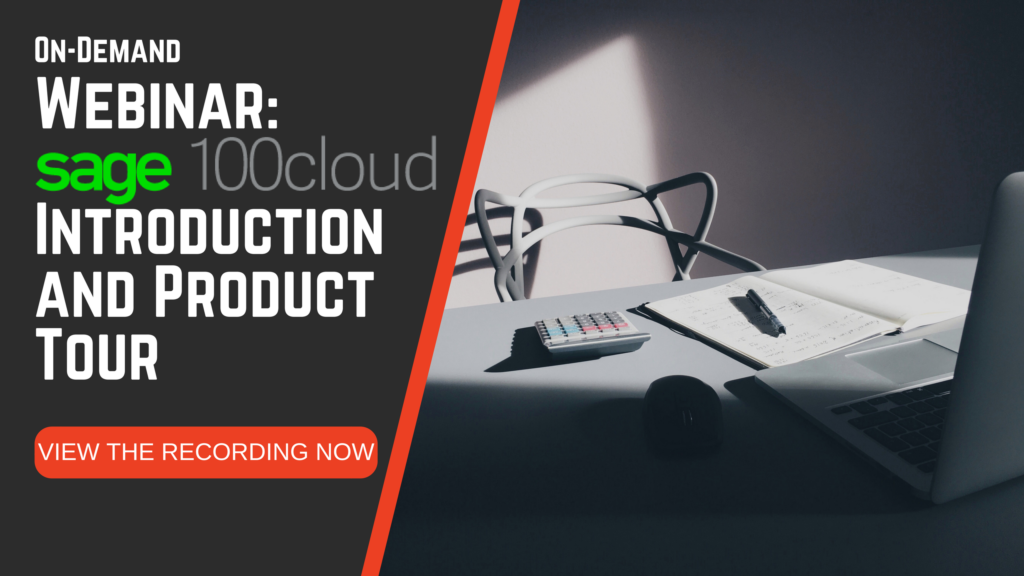Sage has announced that their “C-Line” products, including Sage 50c, Sage 100c, and Sage 300c will be renamed to reflect that “c” indeed stands for cloud. This means that Sage 100c (formerly Sage 100 ERP, MAS 90, and MAS 200) will now be known as Sage 100cloud. The changes are primarily in name and meant to reinforce the added functionality of the connected cloud. The name change is about embracing the future by identifying individual product ecosystems and enabling Sage 100 customers to seamlessly add on new product capabilities such as processing payroll, eCommerce or accepting credit card payments or growing into a larger, more robust solution without a migration headache typically associated with a sizable ERP implementation.
The “C-line” has brought a number of new enhancements and functionalities to the respective Sage products through the connected cloud. Connected Cloud means that Sage users can experience the benefits of cloud, including mobile access, while still being installed on premise. Given these connected cloud capabilities, it was always implied that the “c” stood for cloud (or at the very least connected cloud). The recently announced changes confirm and reinforce this meaning.
| Previous Name | New Name |
| Sage 50c | Sage 50cloud |
| Sage 100c | Sage 100cloud |
| Sage 300c | Sage 300cloud |
The on-premise Sage 100 your business uses today will continue to operate in the same way, but can now connect the Sage Business Cloud to a wide variety of additional services to further strengthen your solution. It has all of the security and familiarity of the desktop solution you know today plus the added productivity and mobility of cloud-based connected services. A number of the cloud services are already available such as Sage AP Automation, Sage Inventory Advisor, Sage eCommerce (expected June 2018), and the Microsoft Office 365 integration for Sage 100 as well as a number of other services coming over the next few months, including:
Those who have been familiar with the Sage 100 product for a while know that this isn’t the first time its name has changed. Since it was first offered in the 1980s, Sage 100 has gone through a number of reincarnations and rebranding initiatives.
The product now known as Sage 100cloud was first offered in the mid-1980s by a company called State of the Art, Inc under the name Master Accounting Series for the 90s (MAS 90). MAS 200 offered the same accounting, distribution, manufacturing, and e-business management features as MAS 90, but with a client/server architecture for high-speed performance across the internet via dial-up connection.
In 1998, Sage Software acquired State of the Art, Inc. and the MAS line of solutions (including MAS 500 which went on to become Sage 500 ERP). For a while, due to licensing issues in the US, Sage Software operated as BEST Software and offered Best MAS 90 & Best MAS 200. Eventually, the products became Sage ERP MAS 90 & Sage ERP MAS 200.
In 2012 Sage announced that their product offerings, including MAS 90 & MAS 200, would rebrand in order to form a common identity across their diverse product lines. Sage ERP MAS 90 became Sage 100 ERP Standard. Sage ERP MAS 90 Online became Sage 100 ERP Online. Sage ERP MAS 200 became Sage 100 ERP Advanced. Finally, Sage ERP MAS 200 SQL became Sage 100 ERP Premium.
Starting in 2016, Sage offered a “deluxe” version of Sage 100 called Sage 100c. As stated above, the “c” stood for connected, collaborative, and customer focused and the product became what Sage refers to as a connected cloud product. Meaning, it can connect to and integrate with natively-cloud add-ons and act as a stepping stone, unlocking the additional functionality of cloud technologies through a natively on-premise solution. Sage 100c offered the same functions as Sage 100 but with additional benefits such as a modernized user interface, Sage Intelligence Reporting, Sage Inventory Advisor Basics and Sage University. Another big change that came with the new deluxe “c” version of Sage 100, was that the licensing became subscription-based rather than perpetual. Starting in January 2017, subscription-based licensing became the only option for new sales.
In early 2018, Sage stated that the names of the entire connected cloud C-Line will be changed to reflect that the “C” stands for cloud. Sage 100c will now be Sage 100cloud.
The product itself has not changed at all. Sage 100cloud simply expands on the same features and functionality it had when it was called Sage 100c and is still a desktop solution that you can choose to host on-premises or in the cloud. Sage’s cloud-connected strategy is all about adding value to Sage 100 customers and providing them with an easy way to integrate a variety of cloud-connected products and services. This will ensure you continue to derive the maximum value from your on-going investment as your business requirements change and grow.
Again, Sage 100cloud is NOT a cloud-native solution.
The change is primarily messaging and marketing-based. Sage 100cloud is the same product as Sage 100c.
If you are currently using Sage 100c this change will have no immediate impact on your business or processes.
If you have any questions or concerns we encourage you to contact us today.
Find out what’s new in Sage 100cloud 2018.

Solutions by Industry
What's New
ERP Trends Driving Digital Transformation
Read MoreSubmitted by Stephanie Dean on Mon, 02/16/26 - 12:59
Preparing for Your Acumatica 2025 R2 Upgrade
Read MoreSubmitted by Stephanie Dean on Tue, 02/10/26 - 15:06
Data That Works: Turning Numbers into Action with Acumatica
Read MoreSubmitted by Stephanie Dean on Fri, 02/06/26 - 11:03